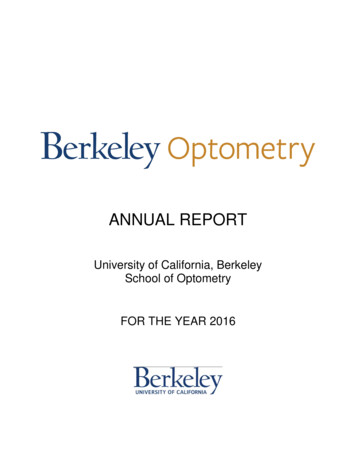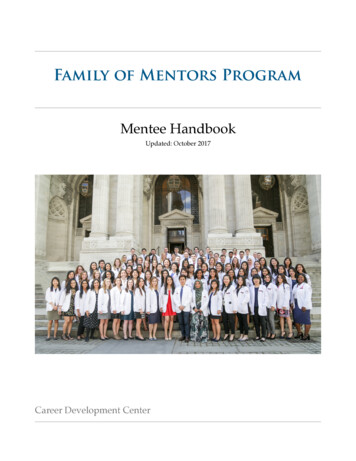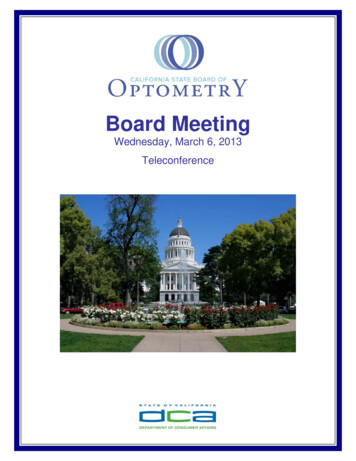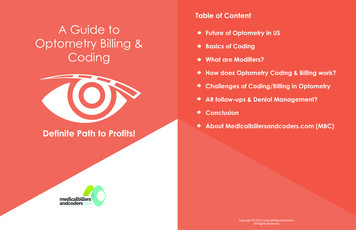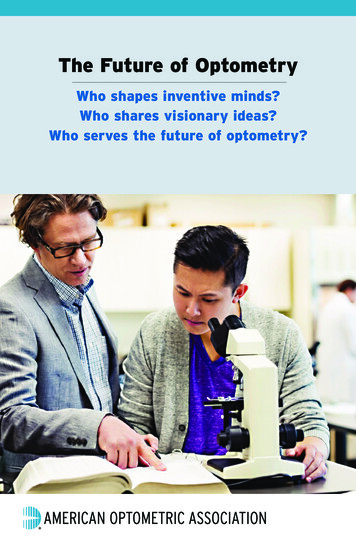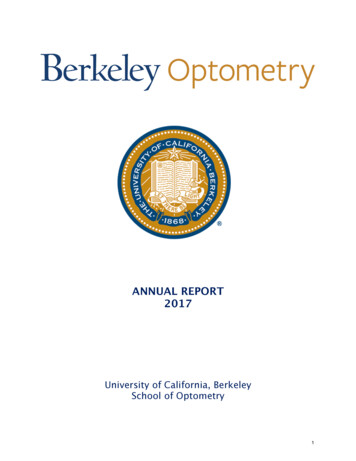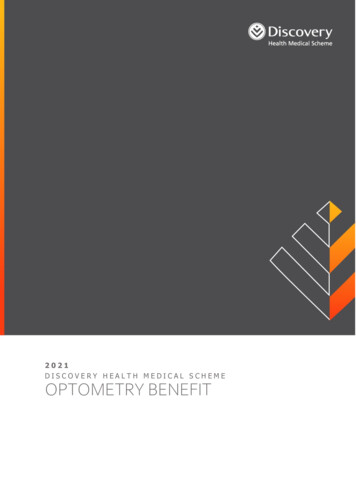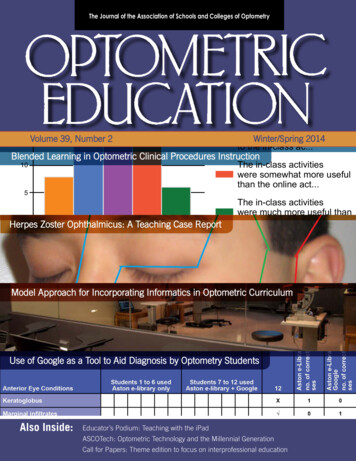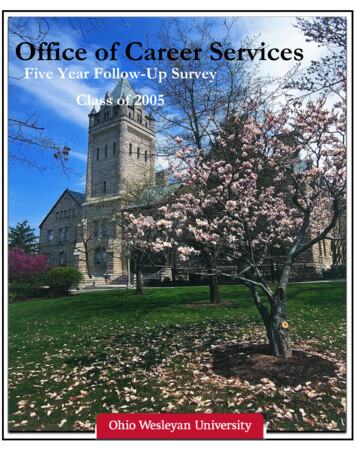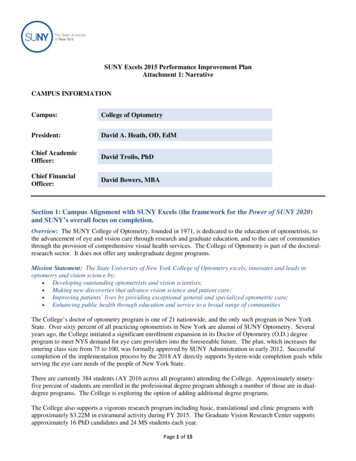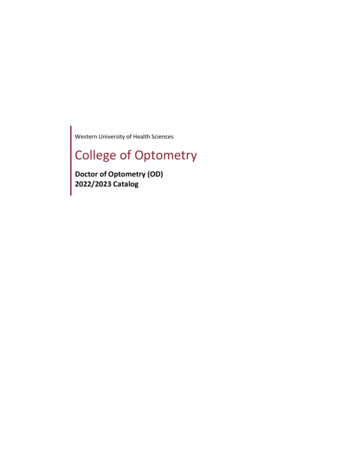
Transcription
Western University of Health SciencesCollege of OptometryDoctor of Optometry (OD)2022/2023 Catalog
COVID-19 ImpactThe contents of this 2022-2023 catalog reflect standard operating conditions for the academic year.However, the global COVID-19 pandemic has resulted in a rapidly changing environment for higher education,and Western University of Health Sciences will respond to those changes in the interest of the health andwell-being of all our students, faculty, staff, and administration. Changes to COVID-19 Vaccine policy,procedure and practice may be necessary from time to time, and these changes will be published using typicalcommunication channels, including mail, email, publication to the university web site, press releases, andother channels as deemed appropriate. These changes may supplement and supersede any inconsistentprovisions found in this Catalog.
Table of ContentsCOVID-19 Impact . 2College of Optometry . 6Accreditation . 6General Information . 6Vision. 6Mission . 6Core Values. 6The OD Degree . 6Goals and Objectives. 6Program Learning Outcomes . 7Personal Competencies for Admission and Matriculation . 10Observation . 10Communication . 11Sensory and Motor Coordination . 11Intellectual-Conceptual, Integrative, and Quantitative. 12Behavioral and Social . 12Admissions Policies and Procedures . 13Non-Discrimination Policy . 13Reasonable Accommodation for Disabilities . 13Application Requirements . 13Academic Requirements . 14Prerequisite Courses . 15Pre-Matriculation Health Standards . 16Applicants with Foreign Coursework . 16International Students . 16Student Selection Process . 17Transfers from Other Optometry Schools . 18International Advanced Standing . 19Registration . 203 Page
Registration Late Fee Appeals . 20Student Health Insurance Requirement. 20New Student Orientation/Welcome Week . 20Student Initiated Changes in Enrollment Status . 20Full-Time/Part-Time Status. 21Time Limits . 21Tuition and Fees . 22Other Fees and Expenses . 22Modified Curriculum/Repeated Coursework Tuition Rates . 22Additional OD Program Education Requirements . 23National Board Fees (NBEO) . 23Clinical Rotations Expenses . 23Financial Assistance . 23General Academic Policies and Procedures . 24Academic Support . 24Counseling . 24Academic Advisement. 24Attendance and Absences . 24Examinations . 25Protocol for Input on Matters of Student Concern . 25Standards of Academic Integrity, Professionalism and Student Conduct . 26Student Honor Code . 26Standards of Academic Progress . 27Student Performance Committee . 27Review of Student Academic Performance . 28Promotion . 28Graduation . 29Adverse Actions . 29Evaluation and Grading . 35Grading Scale, Didactic Courses. 35Grading Scale, Clinical Courses . 35Administrative Grades. 364 Page
Audit. 36Incomplete . 36Withdrawal . 36Missing Grades . 36Grade Reports. 36Grade Changes/Appeals . 37Credit Calculations . 37Curriculum Organization . 38Graduation Service Requirement . 38Elective Coursework. 38Research . 38Instructional Methods . 38Procedural Skills . 39Year 1 . 40Year 2 . 41Year 3 . 42Year 4 . 42Course Descriptions . 43Honors and Awards. 54Academic Calendar . 55The Optometric Oath . 565 Page
College of OptometryAccreditationThe Doctor of Optometry program at Western University of Health Sciences is fully accredited by TheAccreditation Council on Optometric Education (ACOE). The ACOE (243 North Lindbergh Avenue, St. Louis,Missouri: telephone number 800-365-2219) is the accrediting body for professional degree programsoffered by all optometric institutions in the United States.General InformationVisionOur vision is to be a progressive leader in optometric education and to improve the way health care isdelivered worldwide.MissionThe mission of the Western University of Health Sciences College of Optometry is to graduate caring,comprehensive health care professionals who will serve the needs of a diverse global society. The Collegeemphasizes rehabilitation of the visual system, neuro-optometry, and interprofessional education. Weadvance the profession of optometry through innovation in health care education, research, and patientcare.Core ValuesWe value a rich, humanistic tradition and are committed to professional collaboration, communityinvolvement, accountability, integrity, and respect.The OD DegreeThe Doctor of Optometry degree (OD) is awarded in recognition of the highest level of professionaleducation in optometry in the United States. To earn the OD degree, students must successfully completefour years of professional study subsequent to completion of their undergraduate, pre-professionalprerequisites at an accredited college or university. Students who successfully complete this program areeligible to take state optometric licensing examinations. Most states have replaced the writtenexamination with the National Board of Examiners in Optometry (NBEO) examinations, which the studentstake during their academic career. Information on the NBEO licensing examination is available athttp://www.optometry.org. After passing this examination, graduates are eligible to be licensed toperform all the duties and responsibilities of a practicing optometrist.Goals and ObjectivesThe College goals include teaching and learning, research and scholarly activity, and community and publicservice.1. Matriculates will complete the educational and clinical programs successfully.2. Graduates will interact with patients and other health care professionals in a competent, caring,and humanistic way.3. Graduates will be prepared for diverse cultures, experiences, and practice settings.4. The curriculum will emphasize the distinctive elements of the program.6 Page
5. The expertise of the faculty will be aligned with the program emphases as part of a comprehensiveeducational program6. Research conducted will align with the program emphases as part of a comprehensive educationalprogram.7. High quality patient care will be provided in the program emphases as part of a comprehensiveeducational program.8. The College will develop, implement and evaluate improved aspects of health care education,research, and patient care and disseminate best practices and innovations.9. Interprofessional, collaborative, and community-based projects in health care education,research, and patient care will be conducted.Program Learning OutcomesA graduating Doctor of Optometry from Western University of Health Sciences’ College of Optometrymust demonstrate ethical and professional standards appropriate to a health care professional, as well asdemonstrating the biomedical knowledge required to enhance and extend the quality of life in ourcommunities by enhancing visual function.The graduate shall be Professional & Ethical: To serve the public and the profession well, newgraduates must embrace and demonstrate the highest standards of ethical and professional careappropriate to being recognized as a health care provider.The graduate shall be Professional & Ethical: The new graduate must also recognize that thecompletion of the Doctor of Optometry degree program is only the first step in a life-longcommitment to self-directed learning and continual professional improvement.The graduate will have demonstrated the following Personal Attribute: problem-solving andcritical-thinking skills that integrate current knowledge, scientific advances, and the human/socialdimensions of patient care to assure the highest quality of care for each patientThe graduate will have demonstrated the following Personal Attribute: the ability to recognizepersonal limitations regarding optimal patient care and to work with the broader health carecommunity in providing the best care possible.The graduate will have demonstrated the following Professional Attribute: a respect for thedignity of every patient and a commitment to empathetic and confidential careThe graduate will have demonstrated the following Professional Attribute: a commitment to workas an integral member of the larger interprofessional health care team to improve patient careoutcomesThe graduate will have demonstrated the following Professional Attribute: a commitment to beactively involved in organized optometry and the community.7 Page
The graduate will have demonstrated that he or she is knowledgeable of basic organ systems,with special emphasis on the ocular and visual system, and their inter-relationships to the bodyas a wholeThe graduate will have demonstrated that he or she is knowledgeable of the cellular, molecular,and genetic basis of the development, physiology, pathology, and treatment of eye diseaseThe graduate will have demonstrated that he or she is knowledgeable of the structures andprocesses contributing to the development of refractive error and other optical and perceptualabnormalities of the visual system (This includes vision function with respect to deviation andenhancement such as, but not limited to, strabismus, amblyopia, oculomotor function,accommodation, and visual perception.)The graduate will have demonstrated that he or she is knowledgeable of the optics of the eye andophthalmic lens systems (including spectacles, contact lenses, and low vision devices) used tocorrect refractive, oculomotor, and other vision disordersThe graduate will have demonstrated that he or she is knowledgeable of the various processesand causes that lead to dysfunction and disease, and the effect that these processes can have onthe body and its major organ systems, with special emphasis on the ocular and visual systemsThe graduate will have demonstrated that he or she is knowledgeable of mechanisms of action ofthe various classes of pharmaceutical agents, their interactions, and their safe and effective usefor the treatment of diseases and conditions affecting the eye and visual systemThe graduate will have demonstrated that he or she is knowledgeable of vision therapy and otherrehabilitative methods used for the management of common visual disorders and special patientpopulationsThe graduate will have demonstrated that he or she is knowledgeable of the psychosocialdynamics of the doctor/patient relationship and understanding of the social, psychological, andeconomic forces affecting diverse patient populationsThe graduate will have demonstrated that he or she is knowledgeable of community health careresources and delivery systems to improve careThe graduate will have demonstrated that he or she is knowledgeable of practice managementstructures and strategies as they pertain to the various practice settings.The graduate will have demonstrated that he or she is knowledgeable of an understanding ofnutritional influences on ocular physiology and systemic health and diseaseCapable: the graduate will have demonstrated all the skills required to the diagnosis, triage,management, and/or treatment of common visual conditions, including or resulting fromrefractive anomalies, abnormalities of accommodation, monocular or binocular vision skills,oculomotor and sensory/perceptual dysfunctions, ocular disease and trauma, prior ocular surgeryand/or laser intervention, systemic disease, and environmental or occupational conditions.8 Page
Capable: the graduate will have demonstrated all the skills required to order and interpretfrequently needed laboratory and diagnostic proceduresCapable: the graduate will have demonstrated all the skills required to understand, evaluate, andapply the use of contemporary imaging technologies in the provision of eye and vision careCapable: the graduate will have demonstrated all the skills required to recognize and initiate thecoordination of patient care requiring advanced medical, systemic, inter-professional or specialtycareCapable: the graduate will have demonstrated all the skills required to recognize life-threateningconditions and to initiate immediate interventionCapable: the graduate will have demonstrated all the skills required to communicate both orallyand in writing, as appropriate for maximizing successful patient care outcomesCapable: the graduate will have demonstrated all the skills required to access evidence-basedknowledge (including through information technology) and manage information, and to applythat information in making decisions about patient care and health care deliveryCapable: the graduate will have demonstrated all the skills required to embrace the culturaldiversity and individual differences that characterize patients, populations and the health careteamCapable: the graduate will have demonstrated all the skills required to work in cooperation withthose who receive care, those who provide care and others who contribute to or support thedelivery of prevention and health services.9 Page
Personal Competencies for Admission and MatriculationA candidate for admission to the Doctor of Optometry program must possess, or be able to achievethrough a reasonable accommodation, certain technical, sensory, and motor function, that wouldenable the individual to carry out the activities described in the sections that follow. Upon matriculationto the program, the student must continue to possess, or be able to achieve through a reasonableaccommodation, the personal competencies outlined below throughout their progression in the Doctorof Optometry program.To provide guidance to those considering optometry as a profession, the Association of Schools andColleges of Optometry (ASCO) has established functional guidelines for optometric education. The abilityto meet these guidelines, along with other criteria established by Western University of Health Sciences,College of Optometry, is necessary for graduation from an optometric professional degree program.One of the missions of Western University of Health Sciences, College of Optometry is to producegraduates fully qualified to provide quality comprehensive eye care services to the public. To fulfill thismission, of Western University of Health Sciences, College of Optometry must ensure that studentsdemonstrate satisfactory knowledge and skill in the provision of optometric care.The functional guidelines in optometric education require that the candidate/student possess appropriateabilities in the following areas which include but are not limited to 1) observation; 2) communication; 3)sensory and motor coordination; 4) intellectual –conceptual, integrative and quantitative abilities; and5)behavioral and social attributes.For candidates or students who require a reasonable accommodation to meet the competencies outlinedbelow, please contact the Harris Family Center for Disability and Health Policy (HFCDHP) at (909) 469-5297.Under all circumstances, a candidate or student should be able to perform the following in a reasonablyindependent manner, with or without a reasonable accommodation:ObservationThe student must be able to acquire a defined level of required knowledge as presented through lectures,laboratories, demonstrations, patient interaction, and self-study. Acquiring this body of informationnecessitates the functional use of visual, auditory, and somatic sensation enhanced by the functional useof other sensory modalities. Examples of these observational skills in which accurate information needsto be extracted in an efficient manner include: Visual Abilities (as they relate to such things as visual acuity, color vision and binocularity):oVisualizing and reading information from papers, films, slides, video and computerdisplaysoObserving optical, anatomic, physiologic and pharmacologic demonstrations andexperimentsoDiscriminating microscopic images of tissue and microorganismsoObserving a patient and noting non-verbal signs10 P a g e
oDiscriminating numbers, images and patterns associated with diagnostic testsand instrumentsoVisualizing specific ocular tissues in order to discern three-dimensional relationships,depth and color changesAuditory Abilities:oUnderstanding verbal presentations in lecture, laboratory and patient settingsoRecognizing and interpreting various sounds associated with laboratory experiments aswell as diagnostic and therapeutic proceduresTactile Abilities:oPalpating the eye and related areas to determine the integrity of the underlying structuresoPalpating and feeling certain cardiovascular pulsesCommunicationThe student must be able to communicate effectively, efficiently and sensitively with patients and theirfamilies, peers, staff, instructors, and other members of the health care team. The student must be able todemonstrate established communication skills. Examples of required communications skills include: Relating effectively and sensitively to patients, conveying compassion and empathy Perceiving verbal and non-verbal communication such as sadness, worry, agitation and lackof comprehension from patients Eliciting information from patients and observing changes in mood and activity Communicating quickly, effectively and efficiently in oral and written English with patientsand other members of the health care team Reading and legibly recording observations, test results and management plans accurately Completing assignments, patient records and correspondence accurately and in a timely mannerSensory and Motor CoordinationStudents must possess the sensory and motor skills necessary to perform an eye examination, includingemergency care. In general, this requires sufficient exteroception sense (touch, pain, temperature),proprioceptive sense (position, pressure, movement, stereognosis and vibratory) and fine motor function(significant coordination and manual dexterity using arms, wrists, hands and fingers).Examples of skill required include but are not limited to: Instillation of ocular pharmaceutical agents Insertion, removal and manipulation of contact lenses11 P a g e
Assessment of blood pressure and pulse Removal of foreign objects from the cornea Simultaneous manipulation of lenses, instruments and therapeutic agents and devices Reasonable facility of movement Injections into the eye, lids or limbsIntellectual-Conceptual, Integrative, and QuantitativeProblem solving, a most critical skill, is essential for optometric students and must be performed quickly,especially in emergency situations. In order to be an effective problem solver, the student must be ableto accurately and efficiently utilize such abilities as measurement, calculation, reasoning, analysis,judgment, investigation, memory, numerical recognition, and synthesis. Examples of these abilitiesinclude being able to: Determine appropriate questions to be asked and clinical tests to be performed; Identify and analyze significant findings from history, examination and other test data; Demonstrate good judgment and provide a reasonable assessment, diagnosis and managementof patients; Retain, recall and obtain information in an efficient manner and Identify and communicate the limits of one’s knowledge and skill.Behavioral and SocialThe student must possess the necessary behavioral and social attributes for the study and practice ofoptometry. Examples of such attributes include: Satisfactory emotional health required for full utilization of one’s intellectual ability; High ethical standards and integrity; An empathy with patients and concern for their welfare; Commitment to the optometric profession and its standards; Effective interpersonal relationships with patients, peers and instructors; Professional demeanor; Effective functioning under varying degrees of stress and workload; Adaptability to changing environments and uncertainties and Positive acceptance of suggestions and constructive criticism.12 P a g e
Admissions Policies and ProceduresNon-Discrimination PolicyIn accordance with all applicable federal, state, and local laws, Western University of Health Sciences(WesternU) is committed to ensuring a campus community free from unlawful discrimination.Accordingly, WesternU prohibits unlawful discrimination on the basis of race, color, national originancestry, citizenship, ethnicity, creed, religion or religious creed, sex or gender (including gender identity),marital status, sexual orientation, disability (both physical and mental) including HIV and AIDS, medicalcondition (cancer and genetic characteristics), pregnancy (which includes childbirth, breastfeeding andmedical conditions related to pregnancy, childbirth or breastfeeding), age, genetic information, militaryand veteran status, or any other characteristic prot
The Doctor of Optometry program at Western University of Health Sciences is fully accredited by The . The ACOE (243 North Lindbergh Avenue, St. Louis, Missouri: telephone number 800-365-2219) is the accrediting body for professional degree programs offered by all optometric institutions in the United States. . Counseling services may be .
